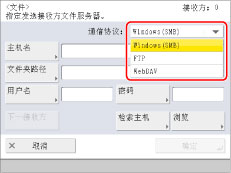使用键盘指定文件服务器
可以直接通过触摸面板显示屏幕上显示的键盘将文件服务器指定为接收方。按[主机名]、[文件夹路径]、[用户名]或[密码]指定文件服务器设置。
1.
按[扫描后发送]→[新接收方]。

2.
按[文件]。

3.
从下拉列表选择所需服务器协议。

可以使用以下服务器协议。
发送前请确认接收方的系统环境。
系统要求:
|
通信协议
|
系统要求
|
应用程序
|
|
FTP
|
Solaris 10
Mac OS X 10.7/10.8/10.9
Red Hat Linux 9
|
-
|
|
Windows Server 2003 R2 SP2
|
Internet Information Services 6.0
|
|
|
Windows Vista SP2
Windows Server 2008 SP2
|
Internet Information Services 7.0
|
|
|
Windows Server 2008 R2 SP2
Windows 7
|
Internet Information Services 7.5
|
|
|
Windows 8
Windows Server 2012
|
Internet Information Services 8.0
|
|
|
Windows 8.1
Windows Server 2012 R2
|
Internet Information Services 8.5
|
|
|
Windows(SMB)
|
Windows Server 2003 R2 SP2
Windows Vista SP2
Windows Server 2008 SP2
Windows Server 2008 R2 SP2
Windows 7
Windows 8
Windows 8.1
Windows Server 2012
Windows Server 2012 R2
|
-
|
|
Red Hat Linux 9
Mac OS X 10.6
|
Samba 2.2/3.0
|
|
|
WebDAV
|
Solaris 10
Red Hat Linux 9
Mac OS X Server 10.7/10.8/10.9
|
Apache 2.0
|
|
Windows Server 2003 R2 SP2
|
Internet Information Services 6.0
|
|
|
Windows Vista SP2
Windows Server 2008 SP2
|
Internet Information Services 7.0
|
|
|
Windows Server 2008 R2 SP2
Windows 7 |
Internet Information Services 7.5
|
|
|
Windows 8
Windows Server 2012
|
Internet Information Services 8.0
|
|
|
Windows 8.1
Windows Server 2012 R2
|
Internet Information Services 8.5
|
|
须知
|
|
如果正在使用WebDAV并且使用代理服务器连接到互联网,则代理服务器必须支持IPv6。
|
4.
指定各项设置。
|
项目
|
说明
|
|
主机名
|
主机名是为可以提供网络服务的主计算机指定的名称。在此输入框中输入网络上的文件服务器名称,作为发送作业的接收方。
如果选择[FTP]或[WebDAV]作为服务器协议,也可以通过在主机名地址后面输入冒号(:)和端口号来指定端口号。
示例:192.168.100.50:21000
向IPv6主机发送文档时,请为[主机名]指定以下设置:
[IPv6地址]:<端口号>
示例:[5aed:90a0:bc05:01d2:568a:2fc0:0001:12ee]:21000
确保为“主机名”输入的端口号与指定给接收发送文档的FTP服务器或WebDAV服务器的端口号相同。
|
|
文件夹路径
|
文件夹路径是一系列表示文件夹位置的字符。将文件服务器中的文件夹指定为发送作业的接收方。
|
|
用户名
|
文件服务器的登录用户名。
要仅输入用户名:
示例:user_name
最多20个字符
要输入用户名和域名:
示例:domain_name\user_name
域名:最多15个字符
用户名:最多20个字符
要输入UPN(用户主要名称):
示例:user_name@domain_name.com
最多128个字符
|
|
密码
|
文件服务器的登录密码。
|
要添加其他接收方,按[下一接收方]→重复步骤3到4。
如果选择[Windows(SMB)]作为服务器协议,可以通过按[浏览]指定文件服务器。有关使用“浏览”键的说明,请参阅“使用浏览键指定文件服务器(Windows(SMB))”。
如果选择[Windows(SMB)]作为服务器协议,可以通过按[检索主机]指定文件服务器。有关使用“检索主机”键的说明,请参阅“使用检索主机键指定文件服务器(Windows(SMB))”。
|
注释
|
|
如果选择[主机名]中的[WebDAV]作为服务器协议,且在主机名的起始位置将“HTTP://”指定为协议模式,则使用HTTP协议。如果在主机名的起始位置将“HTTPS://”指定为协议模式,则使用SSL+HTTP(HTTPS)协议。将“HTTPS://”指定为协议模式可以启用服务器和本机间的SSL通信。通过将[确认WebDAV发送的SSL证书]设置为“打开”,可以确认使用WebDAV发送时SSL服务器证书是否有效。
只有接收发送文档的计算机属于用Active Directory操作的域时,才能使用UPN(用户主要名称)。
根据接收方环境,使用WebDAV发送到互联网上的文件服务器时,可能需要代理服务器设置。(请参阅“TCP/IPv4和TCP/IPv6的通用设置”)
|
5.
按[确定]。